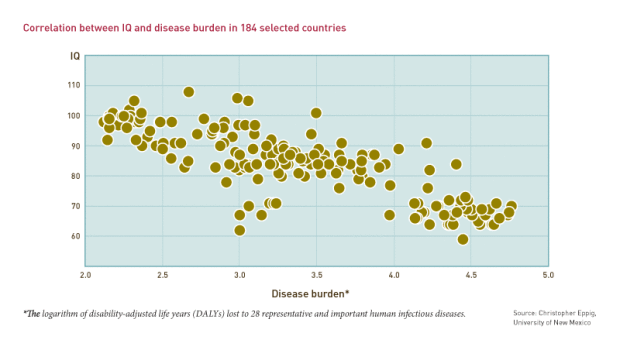Even Bill Gates has an infographics section. In his 2011 annual letter, Gates focuses on Polio and vaccines, and uses graphics to highlight spots. Most of them have to do with the decrease in number of Polio cases and increase in vaccine coverage, but there’s one graph that I gave a double take. It shows the correlation between IQ and disease burden. Question of the day: if we decrease disease burden in a country by improving healthcare (or availability of vaccines), will the country as a whole become smarter, or are better educated people generally healthier?
[Gates Foundation | Thanks, Michael]


 Visualize This: The FlowingData Guide to Design, Visualization, and Statistics (2nd Edition)
Visualize This: The FlowingData Guide to Design, Visualization, and Statistics (2nd Edition)

hi.! i think i’ve read this graph in a controversial article (link here) by the Royal Society for Biological Sciences. lots of questions than answers here :))
hmm interesting, relates well to the Flynn Effect, e.g. if you took a average human from 100 years ago their IQ would be about 70 i.e. intellectuality subnormal today
http://en.wikipedia.org/wiki/Flynn_effect
David Shenk has written a good book on this, here’s his TED talk
hehe, this old chestnut of correlation and causation…
To be honest, I can see a logical relationship in both directions but I suspect most people would read it differently depending on what you choose for x and y axis (ie usually data plotted in y axis would be assumed to be a function of data in x axis), here IQ as a function of disease burden or “if we decrease disease burden in a country by improving healthcare (or availability of vaccines), the country as a whole become smarter”
As a side note, I have been a casual reader of the blog for a year and always enjoyed your posts, but have dived more in details for a good few hours this weekend to read and use some of your tutorials and resources. This blog is definitely a fantastic resource and I was able to create some funky visualisations really quickly thanks to your articles.. So thanks very much for this!
Data Visualisation rocks!!
I’m intrigued as to which country has an average IQ of 109, but Bill doesn’t provide the data source. He mentions the researcher, but not any papers we can look up.
Anyone who is confused by this should try studying for a test with a 105deg fever. Seriously. Anyway, disease burden is correlated w/ poverty as well which obviously affects academic achievement. Remember, IQ is not “natural intelligence”, there is no such thing, or at least it can’t be measured. IQ is very heavily correlated with academic support and nurturing.
@Jacob Singh: “IQ is not “natural intelligence”, there is no such thing, or at least it can’t be measured. IQ is very heavily correlated with academic support and nurturing”
Exactly what I was going to write. IQ tests are biased in their estimation of intelligence.
There is a problem of endogeneity here http://en.wikipedia.org/wiki/Endogeneity_%28economics%29 because both are functions of income.
The causal impact of disease burden on IQ has been well-established. C.f. Doug Almond’s research on the Spanish Flu or Hoyt Bleakley’s research on hookworm. My blog post on this has some links: http://methodlogical.blogspot.com/2010/11/why-do-development-economists-care.html. Kremer and Miguel’s “Worms” paper looks at another possible mechanism, namely school attendance.
Commenters on stories like this have an incredibly frustrating tendency to say “haha correlation != causation so we know nothing” without taking the time to determine whether we know anything about causality, or even what we would need to know in order to make causal inferences. I have trouble thinking of a more infuriating kind of pseudo-intellectualism. It’s not clever, and it contributes nothing to the conversation.
“C.f.”?…
What do you mean by that?
CompactFlash?
Cystic fibrosis? (you’re talking about health after all…)
Aaaah! You actually meant “Cf.”, short for latin “confer”…
It is really frustrating and infuriating when people cannot make correct use of abbreviations, especially when trying to show some kind of pseudo-intellectualism by using latin.
You make a strong point that totally invalidates my argument.
just a bit of sarcasm in an attempt to tell you to “chill” – but humor does not seem to be your strong point…
I would say that if there is a causal effect of IQ -> disease, then improving health care will result in a lowered average IQ. The smarter people are preventing themselves from getting sick. If you ensure that those that get sick survive more then you are removing the selection against them and enabling the less intelligent people to survive.
yes one could logically argue that disease -> IQ (but remember you don’t study for an IQ test) but the notion that IQ is important to survival is unpalatable to society, (because of the social implications) yet we reward better performing workers with higher salaries.
IQ has to be one of the most important measures of fitness we have even if it is can never be an exact measurement. What is important is that statistically it is unshakable.